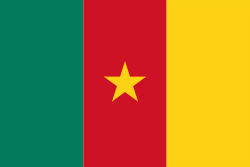Ambam
Ambam is a town and commune in South Province of Cameroon on the border with Equatorial Guinea and Gabon. This frontier town is located approximately 220 km from Yaoundé and as of 2005 had a population of 1,596. Traditionally, it has traded with its neighbouring countries across the border. The Fang are the main ethnic group.
This town was once occupied by the Germans under the nation of Kamerun. The Germans built several administrative buildings in Ambam as it was of strategic importance.
On 14 December 2000, the building proposal of a new road connecting Ambam to Eking on the Gabonese border was passed and signed on 2 February 2001. The building of the 27 kilometre road was funded by African Development Foundation (ADF) and the Government of Cameroon and was intended to improve socio-economic infrastructure and to improve the institutional capacities of the Ministries of Public Works (MINTP), Forestry and Wildlife (MINFOF), and Environment and Protection of Nature (MINEP).
In June 2009, a workshop funded by the European Union and the Economic and Monetary Community of Central African States (CEMAC) met in Ambam to discuss the future of the plaintain and the banana industry in the region. In January 2010, the mayor of Ambam, Ela Jolinon Ekoto, was arrested and charged in Ebolowa for the embezzlement of 20 million CFA Francs of communal funds from the town hall.
This town was once occupied by the Germans under the nation of Kamerun. The Germans built several administrative buildings in Ambam as it was of strategic importance.
On 14 December 2000, the building proposal of a new road connecting Ambam to Eking on the Gabonese border was passed and signed on 2 February 2001. The building of the 27 kilometre road was funded by African Development Foundation (ADF) and the Government of Cameroon and was intended to improve socio-economic infrastructure and to improve the institutional capacities of the Ministries of Public Works (MINTP), Forestry and Wildlife (MINFOF), and Environment and Protection of Nature (MINEP).
In June 2009, a workshop funded by the European Union and the Economic and Monetary Community of Central African States (CEMAC) met in Ambam to discuss the future of the plaintain and the banana industry in the region. In January 2010, the mayor of Ambam, Ela Jolinon Ekoto, was arrested and charged in Ebolowa for the embezzlement of 20 million CFA Francs of communal funds from the town hall.
Map - Ambam
Map
Country - Cameroon
 |
 |
| Flag of Cameroon | |
Early inhabitants of the territory included the Sao civilisation around Lake Chad, and the Baka hunter-gatherers in the southeastern rainforest. Portuguese explorers reached the coast in the 15th century and named the area Rio dos Camarões (Shrimp River), which became Cameroon in English. Fulani soldiers founded the Adamawa Emirate in the north in the 19th century, and various ethnic groups of the west and northwest established powerful chiefdoms and fondoms. Cameroon became a German colony in 1884 known as Kamerun. After World War I, it was divided between France and the United Kingdom as League of Nations mandates. The Union des Populations du Cameroun (UPC) political party advocated independence, but was outlawed by France in the 1950s, leading to the national liberation insurgency fought between French and UPC militant forces until early 1971. In 1960, the French-administered part of Cameroon became independent, as the Republic of Cameroun, under President Ahmadou Ahidjo. The southern part of British Cameroons federated with it in 1961 to form the Federal Republic of Cameroon. The federation was abandoned in 1972. The country was renamed the United Republic of Cameroon in 1972 and back to the Republic of Cameroon in 1984 by a presidential decree by president Paul Biya. Paul Biya, the incumbent president, has led the country since 1982 following Ahidjo's resignation; he previously held office as prime minister from 1975 on. Cameroon is governed as a Unitary Presidential Republic.
Currency / Language
| ISO | Currency | Symbol | Significant figures |
|---|---|---|---|
| XAF | Central African CFA franc | Fr | 0 |
| ISO | Language |
|---|---|
| EN | English language |
| FR | French language |















